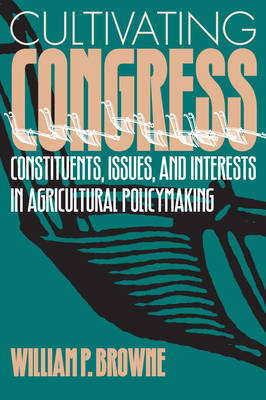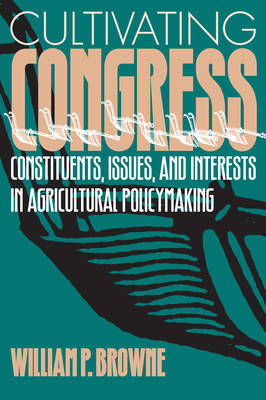
- Afhalen na 1 uur in een winkel met voorraad
- Gratis thuislevering in België vanaf € 30
- Ruim aanbod met 7 miljoen producten
- Afhalen na 1 uur in een winkel met voorraad
- Gratis thuislevering in België vanaf € 30
- Ruim aanbod met 7 miljoen producten
Zoeken
Cultivating Congress Constituents, Issues, and Interests in Agricultural Policymaking
William P Browne
€ 64,45
+ 128 punten
Omschrijving
Congress in the mid-1990s remains the object of voter discontent. Public outcries against special interests and unresponsive incumbents have amplified an already pervasive skepticism toward Beltway politics. And while Congress continues to conduct its business, William Browne argues that it is no longer business as usual. Browne opens up the inner sanctums of Congress to reveal how that institution's daily operations-i.e., its policymaking processes-have changed dramatically. He argues that Congress is no longer dominated by party and committee power-brokers, large organized interest groups, or intrusive federal agencies. Instead, he contends, congressional members are driven largely by grassroots issues and constituent interests. This shift occurred in response to reforms that diluted the congressional seniority system and empowered the rank-and-file to exert greater influence in policymaking. More members now generate more issues much earlier in that process, resulting in a greater diversity of views in previously entrenched policy domains, but also greater disorganization and less predictability. Those changes are nowhere more apparent than in the ever shifting arena of agricultural policymaking, which, as the single largest contributor to our GNP, remains a central part of American politics. As agriculture has become more fragmented, globalized, and environmentally aware, agricultural policymaking has grown increasingly complex. In the process, a cacophony of constituent policy demands has altered the way congressional members "play the game." Browne reveals exactly how that new game is played. Based on nearly 450 interviews with members of Congress, their staff, agency administrators, and lobbyists, Browne's study is timed to appear during the 1995 Congressional debates over a major new agriculture bill. His book should become a major resource--for congressional staff, journalists, political scientists, economists, lobbyists, and policy administrators--for understanding those debates.
Specificaties
Betrokkenen
- Auteur(s):
- Uitgeverij:
Inhoud
- Aantal bladzijden:
- 320
- Taal:
- Engels
- Reeks:
Eigenschappen
- Productcode (EAN):
- 9780700607013
- Verschijningsdatum:
- 26/04/1995
- Uitvoering:
- Paperback
- Formaat:
- Trade paperback (VS)
- Afmetingen:
- 151 mm x 228 mm
- Gewicht:
- 498 g

Alleen bij Standaard Boekhandel
+ 128 punten op je klantenkaart van Standaard Boekhandel
Beoordelingen
We publiceren alleen reviews die voldoen aan de voorwaarden voor reviews. Bekijk onze voorwaarden voor reviews.











